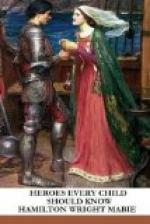“I shall do no such thing, I promise you,” replied Philip; “for I mean to go to the fair, and see the fun. You may stay at home, if you like—for I don’t want to be plagued with your company.”
“Oh, dear!” cried Henric, “but I want very much to go to the fair, and see the fun too.”
“Come along then,” said Philip; “or we shall not get there in time to see the tumblers, or the apes and dancing bears, or the fire-eaters, or any other of the shows.”
It was nearly two hours before the truants were missed by Henric’s mother and Lalotte; for they were all that time busy in the dairy. At length they heard the children cry; on which, Lalotte ran into the room, and found no one with them but Lewis.
“What a shame,” cried Lalotte, “for that lazy boy Philip, to leave all these little ones, with only you, Lewis. Where is Henric, pray?”
“Oh! Henric is gone to the fair with cousin Philip,” lisped little Lewis.
“Oh that wicked Philip!” cried Lalotte. “Aunt! aunt! Philip has run off to Altdorf fair, and taken Henric with him!”
“My dear Lalotte,” said her aunt, “you must put on your hood and sabots, and run after them. Perhaps, as you are light-footed, you can overtake them, and bring Henric back. I am sure, some mischief will befall him.”
Lalotte hastily threw her gray serge cloak about her, and drew the hood over her head. She slipped her little feet into her sabots, or wooden shoes, and took the road to Altdorf, hurrying along as fast as she could, in hope of overtaking the truants before they reached the town.
More than once the little maiden thought of turning back, but the remembrance of Philip’s rash and inconsiderate temper filled her with alarm for the safety of the child whom he had tempted away from home. She reflected that, as her uncle was at Altdorf, it would be her wisest course to proceed thither to seek him out, and to inform him of his little boy being then in the fair.
Lalotte entered the market-place of Altdorf, at the moment when her uncle, having disposed of his chamois-skins to advantage, was crossing from the carriers’ stalls to a clothier’s booth to purchase woollen cloths for winter garments. Fairs were formerly marts, where merchants and artisans brought their goods for sale; and persons resorted thither, not for the purpose of riot and revelling, but to purchase useful commodities, clothing, and household goods at the best advantage.
William Tell had been requested by his careful wife to purchase a variety of articles for the use of the family. He was so intent in performing all her biddings, to the best of his ability, that he never once thought of the cap which the insolent governor, Gessler, had erected in the market-place, till he found himself opposite to the lofty pole on which it was exalted. He would have passed it unconsciously had he not been stopped by the German soldiers, who were under arms on either side the pole, to enforce obedience to the insulting edict of the governor of Uri. Tell then paused, and, raising his eyes to the object to which the captain of the guard, with an authoritative gesture, directed his attention, beheld the ducal cap of Austria just above him.




